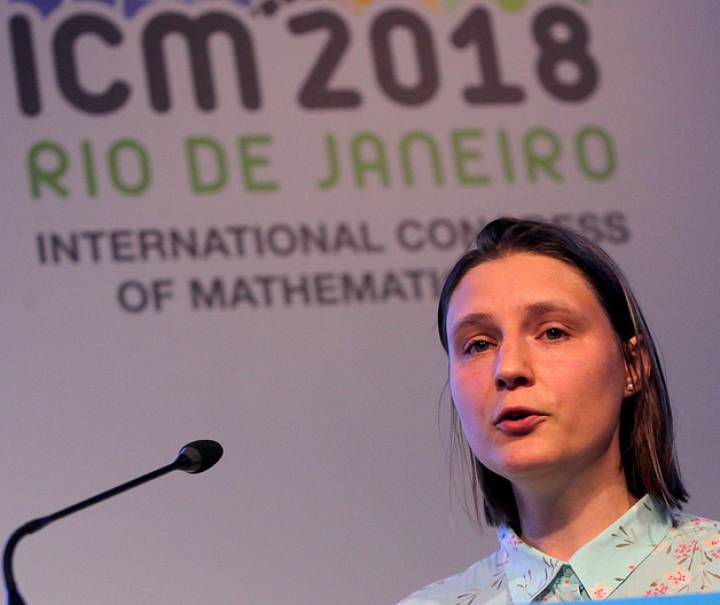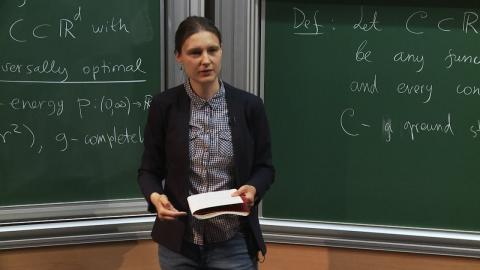Reactions to the Fields Medal awarded to Maryna Viazovska, the second woman to receive mathematics' highest award
Ukrainian mathematician Maryna Viazovska was today awarded one of four Fields Medals, considered the Nobel Prize in mathematics. After Iran's Maryam Mirzakhan, who received it in 2014, she is the second woman to be honoured with this prestigious award.

Clara Grima - medalla Fields EN
Clara Grima
Professor of Mathematics at the Escuela Técnica Superior de Ingeniería Informática (US) and researcher in Computational Geometry
I am very happy that Maryna Viazovska has been awarded one of the four Fields medals, although, on the other hand, a very important part of the world mathematical community is a bit sad because we were waiting for that medal in 2018. She deserved it since then. She alone in 2016 solved a very important geometric problem about packing spheres for dimension 8. She published it alone in the journal Annals of Mathematics, which is possibly the most important journal in mathematics, and then with dimension 24 she also published it in the same journal with other collaborators.
The fact is that Maryna Viazovska's way of proving these problems has been as forceful as it has been elegant and fascinating.
Sphere packing is a very old problem. It consists of demonstrating the optimal way to pack spheres in a way that is as compact as possible, i.e. in a way that leaves as little uncovered space as possible. For example, if it is on a flat surface such as a table, it has already been shown that to group spheres - in the case of a flat surface the spheres are discs, you can think of round coins - the way to do it is to put coins in a hexagonal shape: you put one coin in the middle and six around it forming a hexagon. That's the shape that leaves the least empty space, the most compact. That was demonstrated in 1892, and then packing spheres in three dimensions, so that there was as little space as possible between them, was a problem that was posed to organise the cannonballs in an optimal way. Unfortunately that was the approach, but we can think of the optimal way of stacking round things, oranges or watermelons, and it is precisely the one used by fruit sellers: putting them in a pyramid shape. This seems so obvious that it took a long time to prove it mathematically, and Thomas Hales proved it in 1998, although the proof was not considered valid until 2005 because it required the use of a computer.
Well, in general, mathematicians pose this problem in any dimension, not only in dimension 3, but in any dimension. The usefulness of these problems in any dimension ranges from crystallography to big data, which have a lot of applications. Maryna did it in dimension 8 (nobody in normal conditions can visualise dimension 8) by herself and then in dimension 24. In other words, these are problems that the rest of the cases of dimensions are unsolved, they are tremendously complicated. She solved two of them, one alone and the other one jointly, and in a brilliant and spectacular way, and not within the reach of anyone's understanding, not even possibly mine. This is very advanced mathematics. These are problems of great significance in many areas of knowledge. I am delighted that Maryna has been awarded this prize because she is possibly one of the most brilliant mathematical minds we have in the 21st century and she is very young: she was born in 1984, so she still has a lot to contribute and I hope she continues to contribute and that she becomes - and I hope the media collaborate with this - a great reference point for the girls and boys of this world.
Marta Macho - medalla Fields EN
Marta Macho-Stadler
Full Professor of the Department of Mathematics at the University of the Basque Country (UPV/EHU)
Eight years have passed since the first Fields Medal was awarded to a woman, Iran's Maryam Mirzakhani. In 2018, Ukrainian mathematician Maryna Viazovska was already one of the strong candidates to receive this prestigious award but, unfortunately, it was not possible. In 2022, this recognition is particularly moving, because of the unfair situation her country is suffering and because an excellent scientist is receiving it. This award is fair and 'gives us' a new woman of reference in this discipline, mathematics, which is as complex as it is fascinating.
At the age of 38, Maryna Viazovska has solved one of those problems that is easy to understand, but which requires profound knowledge in all branches of mathematics. And very few people have the ability to understand the nuances of abstract and difficult theories and fit the pieces together to solve problems. Maryna Vaizovska is one of them.
Her main contribution has been the solution to the problem of packing spheres in dimensions 8 and 24; this is a generalisation of the so-called Kepler conjecture for dimension 3, which looks for the optimal way to place dimension 3 spheres (like oranges) so that they take up as little space as possible. The techniques developed by Viazovska to calculate the packing density of spheres in dimensions 8 and 24 could help solve the problem in other dimensions or advance knowledge in many other areas of science.



